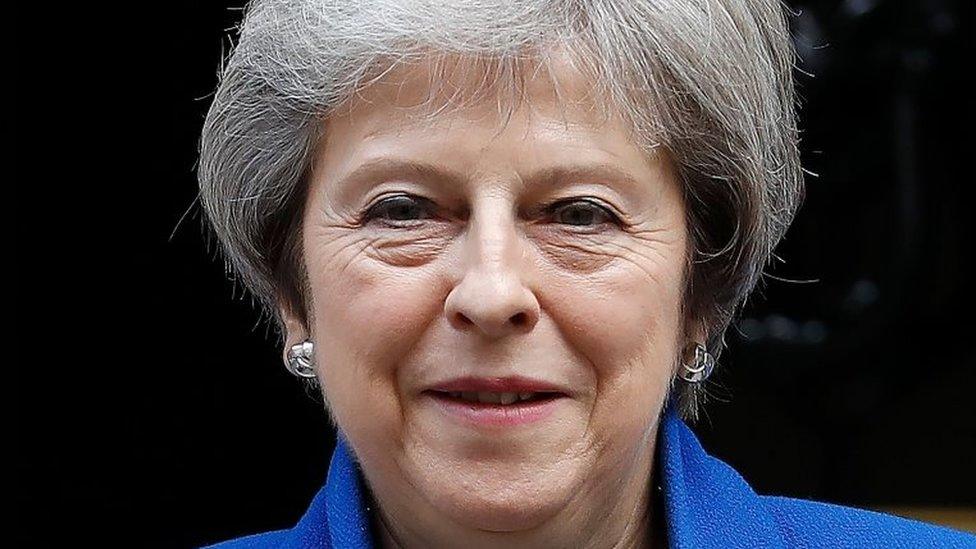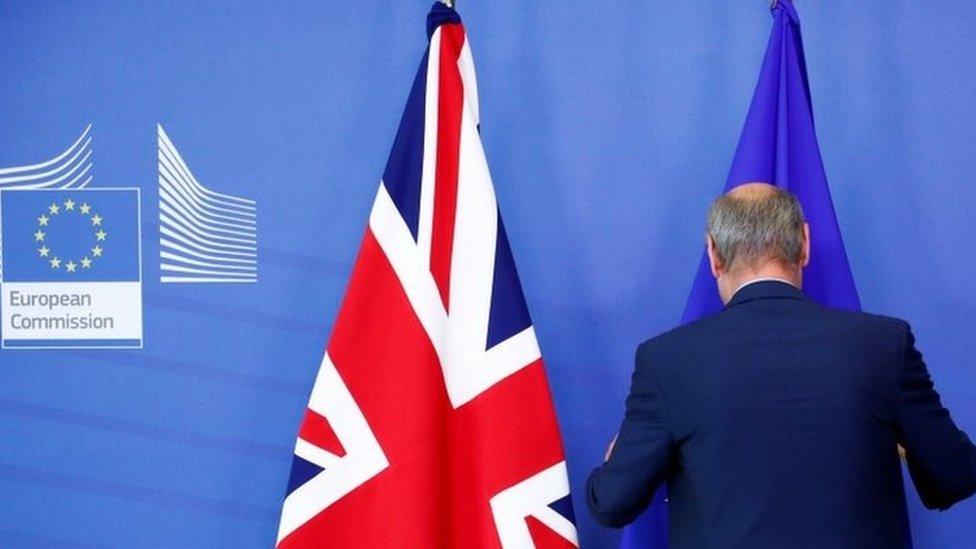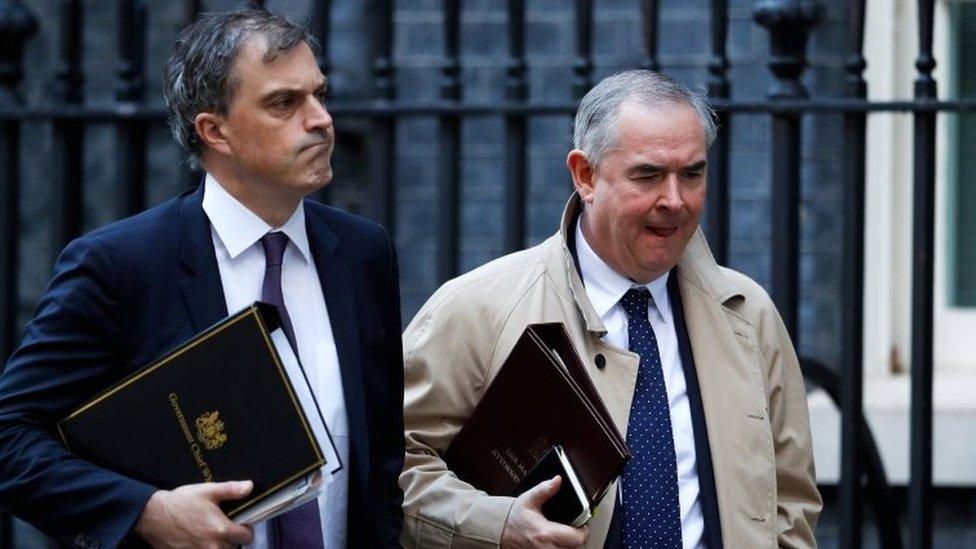Theresa May is taking a huge gamble over Brexit agreement
- Published

They've agreed on a draft of an agreement, and this time Downing Street's ready to sell it to the Cabinet. Or at least try. The time for tinkering and bartering has run out.
So by the time ministers gather around the Cabinet table tomorrow (Wednesday), Theresa May will know whether there'll be empty seats - left by resigning Brexiteers - when the time comes to start selling the plan to the party and to Parliament.
Either way, it seems Theresa May has decided to bank the UK's gains in the Brexit talks, put the best possible gloss on the disappointments, and take her chances.
She is taking a huge chance. She has no choice.
The Cabinet is the first test - or obstacle - and probably both. The risk of resignations has been real and recognised.
But Parliament looks like the ultimate test. And for the life of me, I am unable, as things stand, to make the numbers add up to anything other than a government defeat. That's how it looks tonight, at any rate.
The negotiations in Brussels have closed. The "I"s have been dotted, the "t"s crossed.
But from all I've heard Brussels was holding firm on a crucial red line.
Intractable problems?
EU negotiators - having agreed that the UK as a whole may enter a "temporary" customs territory with the EU to avoid the emergence of a hard Irish border - did not seem at all willing to shift their consistent position and sanction an escape clause for the UK to quit the arrangement at its own discretion whether the EU likes it or not.
All week, Cabinet Brexiteers and like-minded Tory colleagues have been loudly demanding exactly that.

As for the fear of a hard Irish border emerging, Brussels wanted Northern Ireland to remain in the EU customs and regulatory system "unless and until" there's a full blown free trade agreement. They still do.
And they've argued the UK conceded that principle last December.
Mrs May and the UK government has insisted, and still insists, they can't, won't and never will weaken the integrity of the UK.
To the question: will Britain allow Northern Ireland to function under the full range of EU customs and market rules, while mainland Britain does not?, the answer is a very clear "no".
The problem of finding an agreement has seemed intractable. Squaring the Cabinet without resignations may be hard, securing Parliamentary approval could be a political mission impossible. But Theresa May looks to have decided she has no option but to give it a try.
How?
Negotiators have been discussing the use of a regular review mechanism to judge the working of a "temporary" joint customs territory, should it be needed.
The widespread assumption in Whitehall is that it would be; that the chances of striking a comprehensive free trade agreement with the EU by December 2020 (the end of the Brexit transition) are close to negligible.
Independent sovereign state
The widespread assumption, is that those talks could endure maybe three years beyond that.
The role of European Court judges in the process is sensitive to Brexiteers and the final settlement will be a key element of the plan.

Chief Whip Julian Smith and Attorney General Geoffrey Cox in Downing Street
Just another issue for the 58-year-old Government newbie, Attorney General Geoffrey Cox, to analyse and explain to the satisfaction of his fellow Brexiteers.
His stage presence and charisma took us all by surprise at the Conservative Party conference. His newfound importance must be a surprise even to himself.
Will Mrs May may end up having to hard-sell the review mechanism for the "backstop", the fallback plan for a temporary UK and EU customs territory, as the looked-for opportunity to pull out altogether?
That may be a fair bet, although the EU will not acknowledge the review to be any kind of sanctioned escape route from a system it says must be of indefinite duration, and to which both sides must be bound, except by mutual agreement.
Of course, an independent sovereign state can walk away from any deal, any treaty, if it wishes.
The UK would certainly be one after Brexit.
But would the UK wish to build a reputation as an international deal-breaker, while it simultaneously tries to establish a new place and standing in the world as a global power?.
In other words, Mrs May and her European counterparts would agree on a deal and then spin it in quite contradictory ways.
It wouldn't be the first time. Remember the Good Friday Agreement?
Defying the odds?
True, the EU prefers precision. Brexiteers seem to have been painting their own negotiating lines a deeper shade of red every day.
But whoever said this would be easy? Actually, quite a lot of people inside and outside government said that. It seems they may have been mistaken. Or perhaps they were quoted out of context?
The prime minister will surely also be able to claim the integrity of the United Kingdom remains sacred. The EU-side recognises that is another indelible red line.
So some way of recognising the UK government's ultimate right to determine the status of Northern Ireland, while expressing the EU's requirement for harmonisation of customs and regulation on the island of Ireland would be needed. Time, perhaps for another piece of "constructive ambiguity", or maybe more accurately, contradictory spin.
Sounds easy doesn't it? Of course not. Persuading the Cabinet, and Conservative MPs looks like a living nightmare.
Who knows?
Mrs May may defy the odds and somehow pull it off. No-one can rule that out.
But the normal rules of politics - for what they're worth anymore - suggest success will be extraordinarily hard to achieve.
The prime minister may not survive this test.
A Cabinet insurrection might be contained. But even if it is, a Tory (and DUP) rebellion, followed by defeat in the Commons, could easily sink a Brexit plan and Mrs May along with it.
Brexit talks could end in no deal at all, and the Commons could find a way to reject that outcome too, and open up a Pandora's Box of political turmoil: a fresh referendum, for example.
Again, who knows?
There's plenty of evidence that millions of people have turned away from the tortuous twists and turns of Brexit through sheer boredom, compounded by a perfectly understandable lack of understanding. Perhaps they're the lucky ones. The closer you look, the scarier it seems to get.